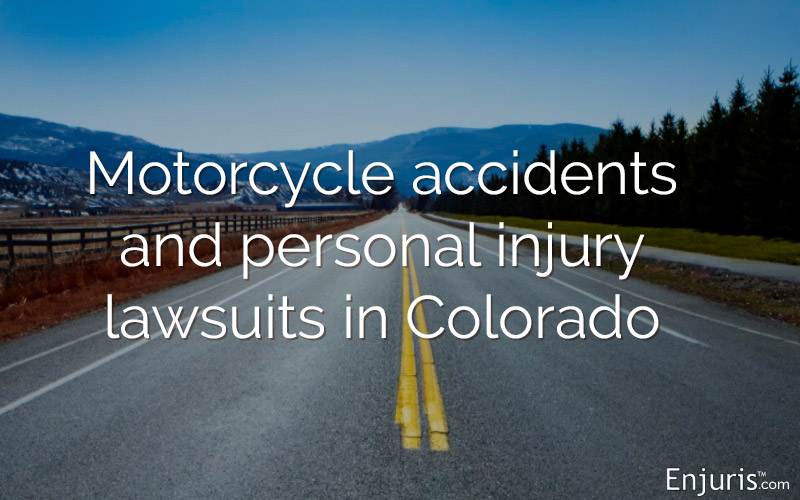Consider fault, damages, time limits and Colorado laws when you look at your motorcycle accident case
On a Sunday afternoon like any other, you're zooming down a beautiful Colorado road on your bike, enjoying the fresh, open air. Whew what a week! You live for the freedom of a good ride on the weekends.
You're coming up on the car in front of you. It's barely crawling, so you prepare to pass.
You're pretty sure the driver has seen you.
As you begin to pull up on their left side, the car swerves unexpectedly.
Turns out the driver hadn't noticed you. They thought they had the road to themselves, so they were checking in on their email...
For most motorcyclists, the biggest fear is to be hit by a car. Even if you do everything right, you still can be seriously hurt by a careless auto driver.
Due to the very serious nature of many motorcycle accidents, it is very important to remember to drive carefully and defensively at all times! Also, make certain you obey all motorcycle traffic laws in Colorado (see a list of motorcycle traffic laws later in this article and the Colorado Motorcycle Operator's Handbook).
Keep the following in mind as you consider what to do after a motorcycle accident, and whether you will pursue legal action against the other driver.
Who's at fault in the motorcycle accident?
After a motorcycle accident in Colorado, the first step that your personal injury attorney will take is to determine who was liable for the accident.
Some of the questions your attorney will ask you
Any lawyer you are talking to about possibly representing your case will want to know the following:
- Were you being "reasonably careful" when riding?
- Were there witnesses to the accident who will testify that the accident was caused by the other driver?
- Did the police come to the scene and was a police report filed?
- Could the motorcycle accident have been easily avoided?
- Was the weather clear?
- Was it day or night?
If your attorney determines that the other driver likely is liable, she will then go to the next step in your case...
Determining motorcycle accident damages
Your attorney will now need to determine what the accident damages are.
Damages will be assessed by asking these questions:
- How severely were you injured?
- Did you miss time from work?
- How much in medical expenses have you incurred to date?
- Have you reached maximum medical improvement or are you still undergoing treatment?
- Will you still be able to work in your current job?
- Did you endure significant mental and physical suffering?
- How much damage was done to your personal property?
Once these questions are answered, your attorney will be able to start to assign a potential value to the case.
How damages are valued
Determining the amount of damages in a Colorado motorcycle accident is the same as with any other personal injury case. There are two types of damages to calculate:
- Special damages: These are damages that can be easily calculated, including property damage, medical costs and lost time at work (past and future). These are relatively simple for the court to calculate, for the most part. For future lost earnings, your attorney will bring in an economist to state their expert opinion.
- Non-economic damages: Damages that cannot be easily calculated, such as pain and suffering. There are no precise guidelines for the judge or jury to follow.
Different values
Determining the exact dollar value of your motorcycle personal injury case will come down to whether you settle out of court or go to trial. (What's the difference?)
The settlement value is how much you would ‘settle' for. The advantage of going this route is you will get your money faster. The down side is that you will probably receive less money.
On the other hand, the trial value is how much you and your attorney think you would get at the end of a trial.
The difference between these values comes into play when you are not sure if you would prevail in a lawsuit. The amount of potential settlement normally reflects how likely that you will win. So, if the value of the case at trial is $100,000 but you think you have just a 50% chance of winning, the settlement value is $50,000.
Should you settle or sue?
This determination must be made by you and your attorney after careful consideration. Many potential lawsuits are settled before they go to trial.
But it comes down to the specific facts of the case.
If it is clear that the other driver is at fault, it is likely that he, as well as his insurance company, will want settle out of court. However, if fault is not as clear cut, there is a chance that the defendant will want to go to trial.
The other major factor to consider is this: How willing are you to wait for compensation?
If you have substantial injuries, you probably have medical bills that need to be paid. If you are missing work due to your injuries, you also will want compensation as soon as possible.
Colorado statute of limitations
Colorado has a statute of limitations of three years for car and motorcycle accidents (C.R.S. 13-80-101). After this time has passed, you can no longer file a lawsuit for compensation.
Therefore, you should not delay if you think that you are going to sue for your injuries. It can take anywhere from a few weeks to months for your attorney to investigate the case and gather evidence.
As you are considering your legal options in your accident, it is worth reviewing Colorado motorcycle laws. If you were obeying all laws at the time of the accident, you have a stronger legal case.
Colorado motorcycle laws
The state of Colorado sets out laws that apply to motorcycle drivers and riders. The NHTSA (National Highway Traffic Safety Administration) also summarizes motorcycle laws, available from its page on motorcycles.
Helmets
Colorado is one state where helmets are optional for those 18 and older. However, anyone under 18 must have a DOT-approved helmet. Still, you would be strongly advised to always wear one. Colorado motorcycle accidents are much more likely to be fatal if you are not wearing a helmet.
In 2014, 38% of national motorcycle accident deaths involved riders who did not wear a helmet.
Eye protection
Eye protection is mandatory for Colorado motorcyclists. The windshield of your bike does not count. You must wear goggles, eyeglasses, or – ideally – a helmet that has a visor.
Passing/overtaking
Do not pass a car in the same lane. This is illegal in Colorado, and of course, it is very dangerous.
Co-riding
You may not lane share with a car or truck, but it is legal to co-ride in the same lane with another motorcycle.
Footrests
All motorcycles in Colorado must have footrests for passengers. They must be used when riding.
Colorado is a comparative negligence state
Remember: If you were not following all Colorado motorcycle laws at the time of the accident, the amount of your settlement or verdict could be less.
This is the case even if the fault was mostly with the other driver. Colorado is a comparative negligence state.
This means you only may be awarded damages according to the percentage of the other driver's fault in the crash.
If the judge or jury find that he was responsible for 75% of the crash and you were responsible for 25%, you will only be awarded 75% of your damages in the case.
If you have not yet spoken to a Colorado motorcycle attorney, here are some resources that can help you:
- Choosing a personal injury attorney – interview questions
- Preparing to meet with a personal injury attorney
- When do you NOT need an attorney after an accident?
More resources
- State-by-state helmet laws (ConsumerReports.org)
- Helmet laws in Colorado (Bikersrights.com)
- Motorcycle accidents in Denver (Denver Post)
See our guide Choosing a personal injury attorney.


